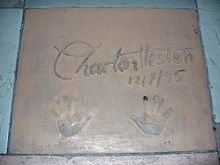- Charlton Heston
-
Charlton Heston 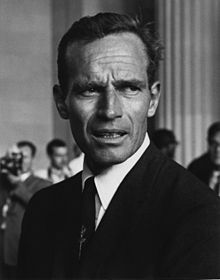
Heston at the 1963 Civil Rights March on WashingtonBorn John Charles Carter
October 4, 1923
No Man's Land, Illinois, U.S.Died April 5, 2008 (aged 84)
Beverly Hills, California, U.S.Nationality American Education New Trier High School Alma mater Northwestern University Occupation Actor, film director, activist Years active 1941–2008 Spouse Lydia Clarke (1944–2008, his death) Charlton Heston (born John Charles Carter; October 4, 1923 – April 5, 2008) was an American actor of film, theatre and television.[1][2][3] Heston is known for heroic roles in films such as El Cid, The Ten Commandments, Planet of the Apes and Ben-Hur, for which he won the Academy Award for Best Actor. He also is well known for his roles in the films Touch of Evil and The Greatest Show on Earth.
Heston was also known for his political activism. In the 1950s and 1960s he was one of a handful of Hollywood actors to speak openly against racism and was an active supporter of the Civil Rights Movement. Initially a moderate Democrat, he later supported conservative Republican policies and was president of the National Rifle Association from 1998 to 2003.
Contents
Early years
Heston was born John Charles Carter, the only child of Lila (née Charlton; 1899–1994) and Russell Whitford Carter (1897–1966), a mill operator.[4] Most sources state that he was born in Evanston, Illinois.[5][6][7][8] Heston's autobiography,[9] however, and some other sources place his birth in No Man's Land, Illinois, which usually refers to a then-unincorporated area now part of Wilmette, a wealthy northern suburb of Chicago. Heston said in a 1995 interview that he was not very good at remembering addresses or his early childhood.[10]
Heston was of English and Scottish descent and was a member of the Fraser clan.[11]
In his autobiography, Heston refers to his father participating in his family's construction business.[9] When Heston was an infant his father's work moved the family to St. Helen, Michigan.[12] It was a rural, heavily forested part of the state, and Heston lived an isolated yet idyllic[citation needed] existence spending much time hunting and fishing in the backwoods of the area.
When Heston was 10 years old, his parents divorced. Shortly thereafter, his mother married Chester Heston. The new family moved back to Wilmette. Heston (his new surname) attended New Trier High School.[13]
Throughout Heston's life he was known by friends as "Chuck" although his wife always called him "Charlie." His stage name Charlton Heston is drawn from his mother's maiden surname (Charlton) and his stepfather's surname (Heston), and was used for his first film, Peer Gynt.
Career
Heston frequently recounted that, while growing up in northern Michigan in a sparsely populated area, he often wandered in the forest, "acting" out the characters from books he had read.[14] Later, in high school, Heston enrolled in New Trier's drama program, playing in the silent 16 mm amateur film adaptation of Peer Gynt, from the Ibsen play, by future film activist David Bradley released in 1941.[15] From the Winnetka Community Theatre (Or, the Winnetka Dramatist's Guild as it was then known) in which he was active, he earned a drama scholarship to Northwestern University. Several years later Heston teamed up with Bradley to produce the first sound version of William Shakespeare's Julius Caesar, in which Heston played Mark Antony.
World War II service
In 1944, Heston enlisted in the United States Army Air Forces. He served for two years as a radio operator and aerial gunner aboard a B-25 Mitchell stationed in the Alaskan Aleutian Islands with the Eleventh Air Force. He reached the rank of Staff Sergeant. Heston married Northwestern University student Lydia Marie Clarke in the same year he joined the military. After his service and rise to fame, Heston was chosen as a narrator for highly classified Military and Department of Energy instructional films, particularly relating to nuclear weapons, and "for six years Heston [held] the nation's highest security clearance" or Q clearance."[16]
Theater and television
After the war, Heston and Clarke lived in Hell's Kitchen, New York City, where they worked as artists' models. Seeking a way to make it in theater, Heston and his wife Lydia decided to manage a playhouse in Asheville, North Carolina in 1947. They made $100 a week on the job. In 1948, they went back to New York where Heston was offered a supporting role in a Broadway revival of Shakespeare's Antony and Cleopatra, starring Katharine Cornell. Heston had success in television, playing a number of roles in CBS's Studio One, one of the most popular anthology dramas of the 1950s. Film producer Hal B. Wallis of Casablanca spotted Heston in a 1950 television production of Wuthering Heights and offered him a contract. When his wife reminded Heston they had decided to pursue theater and television, he replied, "Well, maybe just for one film to see what it's like."
Heston's most frequently played roles on stage include the title role in Macbeth, Sir Thomas More in A Man for All Seasons, and Mark Antony in Julius Caesar and Antony and Cleopatra.
In 1995, Heston starred with Peter Graves, Mickey Rooney and Deborah Winters in the Warren Chaney docudrama, America: A Call to Greatness.[17] Then in 1998, he had a cameo role, playing himself, on the American television series Friends, in The One with Joey's Dirty Day.
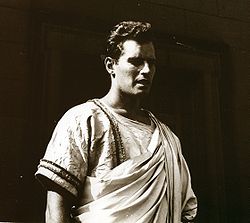 Charlton Heston as Mark Antony in Julius Caesar, 1950
Charlton Heston as Mark Antony in Julius Caesar, 1950
Hollywood
Heston earned recognition for his appearance in his first professional movie, Dark City, a 1950 film noir. His breakthrough came when Cecil B. DeMille cast him as a circus manager in The Greatest Show on Earth, which was named by the Motion Picture Academy as the best picture of 1952. In 1953, Heston was Billy Wilder's first choice to play Sefton in Stalag 17. However, the role was given to William Holden, who won an Oscar for it. Heston became an icon for portraying Moses in the hugely successful film The Ten Commandments (1956), reportedly being chosen by director Cecil B. DeMille because he thought the muscular, 6 ft 3 in, square jawed Heston bore an uncanny resemblance to Michelangelo's statue of Moses. In 1958, Heston played a Mexican police officer named Ramon Miguel Vargas in Orson Welles's widely acclaimed film noir Touch of Evil.
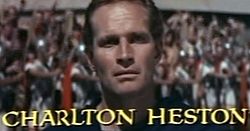 From the film trailer of Ben-Hur
From the film trailer of Ben-Hur
After Marlon Brando, Burt Lancaster and Rock Hudson[18] turned down the title role of Ben-Hur (1959), Heston accepted the role, winning the Academy Award for Best Actor, one of the unprecedented eleven Oscars the film earned. After Moses and Ben-Hur, Heston was identified with Biblical epics more than any other actor. He voiced the role of a cartoon version of the Lew Wallace novel in 2003.
Heston played leading roles in a number of fictional and historical epics: El Cid (1961), 55 Days at Peking (1963), as Michelangelo in The Agony and the Ecstasy (1965), and Khartoum (1966). Heston also played the eponymous role in the western movie, Will Penny (1968).
In 1965, Heston became president of the Screen Actors Guild. He remained in the position until 1971, the second longest tenure to date in that office.[19]
In 1968, Heston starred in Planet of the Apes and in 1970, he was in a smaller supporting role in the sequel, Beneath the Planet of the Apes. Also in 1970, Heston portrayed Mark Antony again in another film version of Shakespeare's Julius Caesar. His co-stars included Jason Robards as Brutus, Richard Chamberlain as Octavius, Robert Vaughn as Casca, and English actors Richard Johnson as Cassius, John Gielgud as Caesar, and Diana Rigg as Portia. In 1971, he starred in the science fiction film, The Omega Man. Although critically panned, the film is now considered a classic of apocalyptic horror. In 1972, Heston made his directorial debut, and starred, as Mark Antony in an adaptation of the William Shakespeare play he performed earlier in his theater career, Antony and Cleopatra. Hildegarde Neil was Cleopatra, and English actor Eric Porter was Enobarbus. After receiving scathing reviews, the film never went to theaters, and rarely turns up on television. It was finally released on DVD in March, 2011.[20] He subsequently starred in successful films such as Soylent Green (1973) and Earthquake (1974).
Beginning with playing Cardinal Richelieu in 1973's The Three Musketeers, Heston was seen in an increasing number of supporting roles, cameos and theater. From 1985 to 1987, he starred in his only prime-time stint on series television with the soap, The Colbys. With his son Fraser, he produced and also starred in several TV movies, including remakes of Treasure Island and A Man For All Seasons. In 1992, Heston appeared in a short series of videos on the A&E cable network reading passages from the King James Version of the Bible, called Charlton Heston Presents the Bible. It was filmed in the Middle East and received excellent reviews, achieving great success on video and DVD. Never taking himself too seriously, he appeared in 1993 in a cameo role in Wayne's World 2 (in a scene wherein main character Wayne Campbell (Mike Myers) requests that a small role be filled by a better actor). After the scene is reshot with Heston, Campbell weeps in awe. That same year, Heston hosted Saturday Night Live. He had cameos in the films Hamlet, Tombstone and True Lies. He starred in many theatre productions at the Los Angeles Music Center where he appeared in such plays as Detective Story, The Caine Mutiny Court Martial, and as Sherlock Holmes in The Crucifer of Blood opposite Jeremy Brett as Dr. Watson, later winning acclaim for his interpretation of the famous detective in a television version. In 2001, Heston made a cameo appearance as an elderly, dying chimpanzee in Tim Burton's remake of Planet of the Apes. Heston's last film role was as the infamous Nazi doctor Josef Mengele in My Father, Rua Alguem 5555, which had limited release (mainly to festivals) in 2003.[21]
Heston's distinctive voice had also landed him roles as a film narrator, including Armageddon and Disney's Hercules.
Heston played the title role in Mister Roberts three times and cited it as one of his favorite roles. In the early '90s, he tried unsuccessfully to revive and direct the show with Tom Selleck in the title role.[22]
Political activism
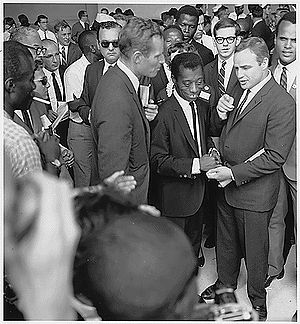 Charlton Heston (left) with James Baldwin, Marlon Brando, and Harry Belafonte at the Civil Rights March on Washington for Jobs and Freedom 1963. Sidney Poitier is in the background.
Charlton Heston (left) with James Baldwin, Marlon Brando, and Harry Belafonte at the Civil Rights March on Washington for Jobs and Freedom 1963. Sidney Poitier is in the background.
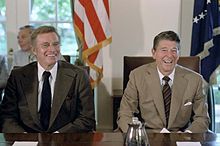 Heston with President Ronald Reagan during a meeting for the Presidential Task Force on the Arts and Humanities in the White House Cabinet Room, 1981
Heston with President Ronald Reagan during a meeting for the Presidential Task Force on the Arts and Humanities in the White House Cabinet Room, 1981
Heston campaigned for Presidential candidate Adlai Stevenson in 1956 and John F. Kennedy in 1960.[23] Reportedly, when an Oklahoma movie theater premiering his movie El Cid was segregated, he joined a picket line outside in 1961.[24] Heston makes no reference to this in his autobiography, but describes traveling to Oklahoma City to picket segregated restaurants, much to the chagrin of Allied Artists, the producers of El Cid.[25] During the March on Washington for Jobs and Freedom held in Washington, D.C. in 1963, he accompanied Martin Luther King Jr. In later speeches, Heston said he helped the civil rights cause "long before Hollywood found it fashionable."[26]
Following the assassination of President Kennedy in 1963, Heston and actors Gregory Peck, Kirk Douglas and James Stewart issued a statement calling for support of President Johnson's Gun Control Act of 1968.[27][28] He opposed the Vietnam War during its course (though he changed his opinion in the years following the war)[29] and in 1969 was approached by the Democratic Party to run for the U.S. Senate. He agonized over the decision and ultimately determined he could never give up acting.[30] He is reported to have voted for Richard Nixon in 1972, though Nixon is unmentioned in his autobiography.[31]
By the 1980s, Heston opposed affirmative action, supported gun rights and changed his political affiliation from Democratic to Republican. When asked why he changed political alliances, Heston replied "I didn't change. The Democratic party changed."[32] He campaigned for Republicans and Republican Presidents Ronald Reagan,[33] George H. W. Bush and George W. Bush.[34]
Heston resigned from Actors Equity, claiming the union's refusal to allow a white actor to play a Eurasian role in Miss Saigon was "obscenely racist".[18] He said CNN's telecasts from Baghdad were "sowing doubts" about the allied effort in the 1990–91 Gulf War.[18]
At a Time Warner stockholders' meeting, Heston castigated the company for releasing an Ice-T album which included the song "Cop Killer", which depicted the killing of police officers.[35]
While filming The Savage, Heston was initiated by blood into the Miniconjou Lakota Nation, but claimed no natural American Indian heritage. He claimed to be "native American" to reclaim the term from exclusion to American Indians.[9]
In a 1997 Fighting the Culture War in America speech, Heston rhetorically deplored a culture war he said was being conducted by a generation of media, educators, entertainers and politicians against:
"...the God fearing, law-abiding, Caucasian, middle-class Protestant – or even worse, evangelical Christian, Midwestern or Southern – or even worse, rural, apparently straight – or even worse, admitted heterosexuals, gun-owning – or even worse, NRA-card-carrying, average working stiff – or even worse, male working stiff – because, not only don’t you count, you are a down-right obstacle to social progress. Your voice deserves a lower decibel level, your opinion is less enlightened, your media access is insignificant, and frankly, mister, you need to wake up, wise up, and learn a little something from your new-America and until you do, would you mind shutting up?"[36]
He went on:
"The Constitution was handed down to guide us by a bunch of wise old dead white guys who invented our country! Now some flinch when I say that. Why! It's true-they were white guys! So were most of the guys that died in Lincoln's name opposing slavery in the 1860s. So why should I be ashamed of white guys? Why is "Hispanic Pride" or "Black Pride" a good thing, while "White Pride" conjures shaven heads and white hoods? Why was the Million Man March on Washington celebrated by many as progress, while the Promise Keepers March on Washington was greeted with suspicion and ridicule? I’ll tell you why: Cultural warfare!"
In an address to students at Harvard Law School entitled Winning the Cultural War, Heston said, "If Americans believed in political correctness, we'd still be King George's boys – subjects bound to the British crown."[37]
He said to the students:
"You are the best and the brightest. You, here in this fertile cradle of American academia, here in the castle of learning on the Charles River. You are the cream. But I submit that you and your counterparts across the land are the most socially conformed and politically silenced generation since Concord Bridge. And as long as you validate that and abide it, you are, by your grandfathers' standards, cowards."[37]
Heston later stated, "Political correctness is tyranny with manners."[38]
In a speech to the National Press Club in 1997, Heston said, "Now, I doubt any of you would prefer a rolled up newspaper as a weapon against a dictator or a criminal intruder."[39]
Heston was the president and spokesman of the NRA from 1998 until he resigned in 2003. At the 2000 NRA convention, he raised a rifle over his head and declared that a potential Al Gore administration would take away his Second Amendment rights "from my cold, dead hands".[40] In announcing his resignation in 2003, he again raised a rifle over his head, repeating the five famous words of his 2000 speech.[41] He was an honorary life member.[41]
In the 2002 film Bowling for Columbine, Michael Moore interviewed Heston in his home, asking him about an April 1999 NRA meeting held shortly after the Columbine high school massacre, in Denver, Colorado. Moore criticized Heston for the perceived thoughtlessness in the timing and location of the meeting. Heston, on-camera, excused himself and walked out. Moore was later criticized for his perceived ambush.[42][43][44]
Actor George Clooney joked about Heston's failing health at a 2003 National Board of Review award ceremony, saying that Heston "announced again today that he is suffering from Alzheimer's." When questioned, Clooney said Heston deserved whatever was said about him for his involvement with the NRA.[45] Heston responded by saying Clooney lacked class, and said he felt sorry for Clooney, as Clooney had as much of a chance of developing Alzheimer's as anyone else.[46]
In April 2003 Heston sent a message of support to US forces in the Iraq war, attacking opponents of the war as "pretend patriots".[47]
Heston opposed abortion and gave the introduction to a 1987 pro-life documentary by Bernard Nathanson called Eclipse of Reason which focuses on late-term abortions. Heston served on the Advisory Board of Accuracy in Media, a conservative media watchdog group founded by Reed Irvine.[48]
Later life and death
In 1996, Heston had a hip replacement. He was diagnosed with prostate cancer in 1998. Following a course of radiation treatment, the cancer went into remission. In 2000, he publicly disclosed that he had been treated for alcoholism at a Utah clinic in May–June of that year.[49] On August 9, 2002, Heston publicly announced he was diagnosed with symptoms consistent with Alzheimer's disease.[50]
 Heston by Jerry Avenaim in 2001
Heston by Jerry Avenaim in 2001
In July 2003, he received the Presidential Medal of Freedom at the White House from President George W. Bush. In March 2005, various newspapers reported that family and friends were shocked by the progression of his illness, and that he was sometimes unable to get out of bed.[51]
Heston died on April 5, 2008, at his home in Beverly Hills, California, with Lydia, his wife of 64 years, by his side. He was also survived by his son, Fraser Clarke Heston, and daughter, Holly Ann Heston. The cause of death was not disclosed by the family.[52][53] Heston's family released a statement, reading:[54]
Charlton Heston was seen by the world as larger than life. He was known for his chiselled jaw, broad shoulders and resonating voice, and, of course, for the roles he played. No one could ask for a fuller life than his. No man could have given more to his family, to his profession and to his country.
— Family of Charlton Heston
Early tributes came in from leading figures; President George W. Bush called Heston "a man of character and integrity, with a big heart", adding, "He served his country during World War II, marched in the civil rights movement, led a labor union and vigorously defended Americans’ Second Amendment rights."[54] Former First Lady Nancy Reagan said that she was "heartbroken" over Heston's death and released a statement, reading, "I will never forget Chuck as a hero on the big screen in the roles he played, but more importantly I considered him a hero in life for the many times that he stepped up to support Ronnie in whatever he was doing."[54]
Heston's funeral was held a week later on April 12, 2008, in a ceremony which was attended by 250 people including Nancy Reagan and Hollywood stars such as California Governor Arnold Schwarzenegger, Olivia de Havilland, Keith Carradine, Pat Boone, Tom Selleck, Oliver Stone, Rob Reiner, and Christian Bale.[55][56][57]
The funeral was held at Episcopal Parish of St. Matthew's Church in Pacific Palisades, California, the church where Heston regularly worshipped and attended Sunday services since the early 1980s.[58][59] He was cremated and his ashes were given to his family.[60]
Legacy
The handprints of Charlton Heston in front of The Great Movie Ride at Walt Disney World's Disney's Hollywood Studios theme park
Richard Corliss wrote in TIME magazine, "From start to finish, Heston was a grand, ornery anachronism, the sinewy symbol of a time when Hollywood took itself seriously, when heroes came from history books, not comic books. Epics like Ben-Hur or El Cid simply couldn't be made today, in part because popular culture has changed as much as political fashion. But mainly because there's no one remotely like Charlton Heston to infuse the form with his stature, fire and guts."[61]
In his obituary for the actor, film critic Roger Ebert noted "Heston made at least three movies that almost everybody eventually sees: Ben-Hur, The Ten Commandments and Planet of the Apes."[62]
Heston's cinematic legacy was the subject of Cinematic Atlas: The Triumphs of Charlton Heston, an eleven-film retrospective by the Film Society of the Lincoln Center that was shown at the Walter Reade Theater from August 29 to September 4, 2008.[63]
On April 17, 2010, Heston was inducted into the National Cowboy and Western Heritage Museum's Hall of Great Western Performers.[64]
Filmography
For a complete filmography, see Charlton Heston filmography.Bibliography
Heston's books include autobiographies and religious books:
- The Actor's Life (ISBN 0-671-83016-3)
- In the Arena: An Autobiography (ISBN 1-57297-267-X)
- The Courage to be Free (ISBN 978-0-9703688-0-5)
- Beijing Diary (ISBN 0-671-68706-9)
- To Be a Man: Letters to My Grandson (ISBN 0-7432-1311-4)
- Charlton Heston Presents the Bible (ISBN 1-57719-270-2)
- Charlton Heston's Hollywood: 50 Years in American Film with Jean-Pierre Isbouts (ISBN 1-57719-357-1)
References
- ^ MSNBC. Charlton Heston dead at 84.
- ^ Date confirmed through 1930 US Census.
- ^ Berkvist, Robert (April 6, 2008). "Charlton Heston, Epic Film Star and Voice of N.R.A., Dies at 84.". The New York Times. http://www.nytimes.com/2008/04/06/movies/06heston.html?_r=1&hp&oref=slogin. Retrieved April 6, 2008. "Charlton Heston, who appeared in some 100 films in his 60-year acting career but who is remembered chiefly for his monumental, jut-jawed portrayals of Moses, Ben-Hur and Michelangelo, died Saturday night at his home in Beverly Hills, California. He was 84."
- ^ Film Reference Biography.
- ^ Werling, Karen (April 16, 2008). "Appreciation: Charlton Heston’s life as a Wildcat". North by Northwestern. http://www.northbynorthwestern.com/2008/04/9017/heston-at-northwestern/. Retrieved March 18, 2010.
- ^ Berkvist, Robert (April 6, 2008). "Charlton Heston, Epic Film Star and Voice of N.R.A., Dies at 84". New York Times. http://www.nytimes.com/2008/04/06/movies/06heston.html. Retrieved March 18, 2010.
- ^ "Charlton Heston – Biography". IMDb: The Internet Movie Database. http://www.imdb.com/name/nm0000032/bio. Retrieved March 18, 2010.
- ^ "Charlton Heston Biography". biography.com. http://www.biography.com/articles/Charlton-Heston-9337556. Retrieved March 18, 2010.
- ^ a b c Heston, Charlton: In The Arena, Simon & Schuster, 1995. ISBN 0-684-80394-1.
- ^ Schultz, Rick (1995). "Appreciation: Charlton Heston’s Interview, Articles, & Tribute". http://charltonhestonworld.homestead.com/ChuckInterviews.html. Retrieved March 18, 2010.
- ^ "Hollywood legend Charlton Heston was proud of Scots roots". Daily Record. April 7, 2008. http://www.dailyrecord.co.uk/entertainment/entertainment-news/2008/04/07/hollywood-legend-charlton-heston-was-proud-of-scots-roots-86908-20375323/.[dead link]
- ^ My Bay City article, February 5, 2006.
- ^ Habermehl, Kris (January 25, 2007). "Fire Breaks Out At Prestigious High School". Archived from the original on 2007-10-31. http://web.archive.org/web/20071031074406/http://cbs2chicago.com/local/New.Trier.High.2.334860.html. Retrieved June 28, 2008.
- ^ Private Screenings: Charlton Heston (1998)
- ^ IMDB.com, IMDB Film Biography.
- ^ "Top Secret". Orlando Sentinel. 11/10/1989. http://articles.orlandosentinel.com/keyword/security-clearance. Retrieved 18 August 2011.
- ^ Internet Movie Database (America: A Call to Greatness) [1]
- ^ a b c Thomas, Bob (April 6, 2008). "Film Legend Charlton Heston Dead at 84". Associated Press. Archived from the original on 2008-04-09. http://web.archive.org/web/20080409211126/http://ap.google.com/article/ALeqM5hIhnqF6LygGpQ54CQdntp6c74tTwD8VSHEV81.
- ^ SAG Presidents, Screen Actors Guild.
- ^ http://www.amazon.com/dp/B004H0M31I
- ^ Variety, February 12, 2004.
- ^ Heston, Charlton: In The Arena, Simon & Schuster, 1995, p. 479. ISBN 0-684-80394-1.
- ^ Mathews, Jay (May 2, 1986). "Charlton Heston, Statesman On the Set; For the 'Colbys' Star, Acting Is Only Part of the Job". The Washington Post: p. D1.
- ^ Taylor, Quintard (1998). In Search of the Racial Frontier: African Americans in the American West. W. W. Norton & Company. p. 285. ISBN 9780393318890. http://books.google.com/books?id=9Nj1lVZQAcYC&pg=PA285&dq=Oklahoma+1961+%22Charlton+Heston%22&ei=W9P4R5zpG5zkyAT4idmDDw&sig=b7pJR3wb17hAeynu-EITSR82gRM.
- ^ Heston, Charlton: In The Arena, Simon & Schuster, 1995, p. 261. ISBN 0-684-80394-1.
- ^ Goodrich, Terry Lee (February 13, 2000). "Heston decries political correctness at fund-raiser". Fort Worth Star-Telegram. p. 5.
- ^ David Plotz; Slate. NRA President Charlton Heston.
- ^ Slate. Charlton Heston, Gun-Controller!
- ^ Heston, Charlton: In The Arena, Simon & Schuster, 1995, pp. 381, 401-403. ISBN 0-684-80394-1.
- ^ Heston, Charlton: In The Arena, Simon & Schuster, 1995, p. 433. ISBN 0-684-80394-1.
- ^ Pulera, Dominic J. (2006). Sharing the Dream: White Males in Multicultural America. Continuum International Publishing Group. p. 254. ISBN 9780826418296. http://books.google.com/books?id=DL3qyFCCp_0C&pg=PA254&dq=%22voted+for+Richard+Nixon%22+%22Charlton+Heston%22&ei=L874R9WFGYzcygSbnqmwCQ&sig=WoFAecl4GZVXcLzcr6RQ58HSNns.
- ^ Raymond, Emilie (2006). From My Cold, Dead Hands Charlton Heston and American Politics. University Press of Kentucky. p. 6. ISBN 9780813124087. http://books.google.com/books?id=1tujw3ajlDMC&pg=PA6&dq=%22affirmative+action%22+%22Charlton+Heston%22&ei=Mc_4R6O6G4PUzATl8vlE&sig=zD6MazBdl6ad_61k0trPe1UFt0M.
- ^ McDowell, Charles (September 14, 1997). "Charlton Heston, the Gun Lobbyist". Richmond Times Dispatch (Virginia): p. B1.
- ^ Raymond, p. 276.
- ^ [2][dead link]
- ^ s:Fighting the Culture War in America
- ^ a b Heston, Charlton. Winning the Cultural War. February 16, 1999.
- ^ Charlton Heston at the Internet Movie Database
- ^ Gold, Dudley Susan. Open For Debate: Gun Control. Benchmark Books. January 2004.
- ^ Variety, June 13, 2000: "Gore fires back after Heston tirade".
- ^ a b Johnson, Jeff (April 25, 2003). "Heston to Step down as NRA President". The Nation. http://www.cnsnews.com/ViewNation.asp?Page=%5CNation%5Carchive%5C200304%5CNAT20030425f.html.[dead link]
- ^ Russo, Tom (August 24, 2003). "Opposites Attract (Bowling for Columbine review)". Boston Globe.
- ^ Ebert, Roger (June 18, 2004). "'9/11': Just the facts?". Chicago Sun-Times: p. 55. "In some cases, [Moore] was guilty of making a good story better, but in other cases (such as his ambush of Charlton Heston) he was unfair..."
- ^ Whitty, Stephen (April 6, 2008). "The best action hero". The Star-Ledger. http://blog.nj.com/whitty/2008/04/the_best_action_hero.html#more.
- ^ What's up with George Clooney? WorldNetDaily.com. January 20, 2003.
- ^ Heston Slams Clooney For Alzheimer's Joke. TheBostonChannel.com. January 23, 2003."
- ^ "Heston's war cry for troops". BBC. April 11, 2003. http://news.bbc.co.uk/1/hi/entertainment/2939419.stm.
- ^ "FAQ". Accuracy in Media. http://www.aim.org/about/frequently-asked-questions-faq/. Retrieved April 6, 2008.
- ^ Charlton Heston 'feeling good' after alcohol rehab.
- ^ Charlton Heston has Alzheimer's symptoms. CNN News. August 9, 2002.
- ^ http://www.contactmusic.com/new/xmlfeed.nsf/story/heston-in-rapid-decline
- ^ Welkos, Robert W. and Susan King. Charlton Heston, 84; actor played epic figures. Los Angeles Times. April 5, 2008. Retrieved April 12, 2010.
- ^ Charlton Heston Dies at Beverly Hills Home. FoxNews.com. April 5, 2008. Retrieved April 12, 2010.
- ^ a b c Ayres, Chris (April 7, 2008). "Charlton Heston, a star who defied the Hollywood liberals, dies at 83". The Times Online (Los Angeles, California). http://entertainment.timesonline.co.uk/tol/arts_and_entertainment/film/article3695075.ece. Retrieved April 7, 2008.
- ^ Politicians, actors and relatives gather for funeral of Hollywood icon Charlton Heston, International Herald Tribune, retrieved April 12, 2008.
- ^ "Stars attend Heston's LA funeral" – BBC News – Page last updated at 11:39 GMT, Sunday, April 13, 2008, 12:39 UK.
- ^ "Fraser Heston in conversation with James Byrne". Secret of the Incas web site. 6 – May 12, 2008. http://www.secretoftheincas.co.uk/page28.html. Retrieved December 13, 2009.
- ^ "Memorial to Mr. Charlton Heston". Charlton Heston World. http://charltonhestonworld.homestead.com/MemorialToMrCharltonHeston.html#anchor_291. Retrieved August 24, 2009.
- ^ Bob Thomas, Associated Press Writer (April 12, 2008). "Luminaries Attend Heston's Funeral". MSNBC. http://www.newsvine.com/_news/2008/04/12/1426985-luminaries-attend-hestons-funeral. Retrieved August 24, 2009.
- ^ "Stars Attend Heston's LA Funeral". BBC. April 13, 2008. http://news.bbc.co.uk/2/hi/entertainment/7345103.stm. Retrieved September 13, 2010.
- ^ "Charlton Heston: The Epic Man" by Richard Corliss, TIME – Thursday, April 10, 2008.
- ^ "Charlton Heston, Richard Widmark: Tough guys, strong presences". Chicago Sun-Times. http://rogerebert.suntimes.com/apps/pbcs.dll/article?AID=/20080410/PEOPLE/323773696.
- ^ "Cinematic Atlas: The Triumphs of Charlton Heston". Film Society of the Lincoln Center. http://filmlinc.com/wrt/onsale/charltonheston.html. Retrieved September 1, 2008.
- ^ "Hall of Great Western Performers". National Cowboy and Western Heritage Museum. http://www.nationalcowboymuseum.org/info/awards-hof/Western-Performers.aspx. Retrieved April 19, 2010.
External links
- "Charlton Heston". Find a Grave. http://www.findagrave.com/cgi-bin/fg.cgi?page=gr&GRid=25772172. Retrieved August 28, 2010.
- Charlton Heston at the Internet Broadway Database
- Charlton Heston at the Internet Movie Database
- Charlton Heston at Yahoo! Movies
- Hollywood.com entry
- Reel Classics
- BBC News Obituary
- Obituary and public tribute
- 'From Our Files: An Interview with Charlton Heston' by Phil Elderkin, The Christian Science Monitor, November 4, 1959
- Charlton Heston, The Actor – French PDF (14 Mo)
Non-profit organization positions Preceded by
Marion P. HammerPresident of the National Rifle Association
1998–2003Succeeded by
Kayne RobinsonAcademy Award for Best Actor (1941–1960) Gary Cooper (1941) · James Cagney (1942) · Paul Lukas (1943) · Bing Crosby (1944) · Ray Milland (1945) · Fredric March (1946) · Ronald Colman (1947) · Laurence Olivier (1948) · Broderick Crawford (1949) · José Ferrer (1950) · Humphrey Bogart (1951) · Gary Cooper (1952) · William Holden (1953) · Marlon Brando (1954) · Ernest Borgnine (1955) · Yul Brynner (1956) · Alec Guinness (1957) · David Niven (1958) · Charlton Heston (1959) · Burt Lancaster (1960)
Complete list · (1928–1940) · (1941–1960) · (1961–1980) · (1981–2000) · (2001–2020) Academy Awards Jean Hersholt Humanitarian Award Y. Frank Freeman (1956) · Samuel Goldwyn (1957) · Bob Hope (1959) · Sol Lesser (1960) · George Seaton (1961) · Steve Broidy (1962) · Edmond L. DePatie (1965) · George Bagnall (1966) · Gregory Peck (1967) · Martha Raye (1968) · George Jessel (1969) · Frank Sinatra (1970) · Rosalind Russell (1972) · Lew Wasserman (1973) · Arthur B. Krim (1974) · Jules C. Stein (1975) · Charlton Heston (1977) · Leo Jaffe (1978) · Robert Benjamin (1979) · Danny Kaye (1981) · Walter Mirisch (1982) · M. J. Frankovich (1983) · David L. Wolper (1984) · Charles “Buddy” Rogers (1985) · Howard W. Koch (1989) · Audrey Hepburn / Elizabeth Taylor (1992) · Paul Newman (1993) · Quincy Jones (1994) · Arthur Hiller (2001) · Roger Mayer (2005) · Sherry Lansing (2007) · Jerry Lewis (2009)
Hosts of the Academy Awards ceremonies (1961–1980) Bob Hope (1961) · Bob Hope (1962) · Frank Sinatra (1963) · Jack Lemmon (1964) · Bob Hope (1965) · Bob Hope (1966) · Bob Hope (1967) · Bob Hope (1968) · None (1969) · None (1970) · None (1971) · Helen Hayes / Alan King / Sammy Davis, Jr. / Jack Lemmon (1972) · Carol Burnett / Michael Caine / Charlton Heston / Rock Hudson (1973) · John Huston / Burt Reynolds / David Niven / Diana Ross (1974) · Sammy Davis, Jr. / Bob Hope / Shirley MacLaine / Frank Sinatra (1975) · Goldie Hawn / Gene Kelly / Walter Matthau / George Segal / Robert Shaw (1976) · Warren Beatty / Ellen Burstyn / Jane Fonda / Richard Pryor (1977) · Bob Hope (1978) · Johnny Carson (1979) · Johnny Carson (1980)
Complete list · (1927–1940) · (1941–1960) · (1961–1980) · (1981–2000) · (2001–2020) Kennedy Center Honorees 1970s 197819791980s 19801981198219831984198519861987198819891990s 199019911992Lionel Hampton · Paul Newman & Joanne Woodward · Ginger Rogers · Mstislav Rostropovich · Paul Taylor19931994199519961997199819992000s 20002001200220032004200520062007200820092010s 20102011Presidents of the Screen Actors Guild Ralph Morgan (1933) · Eddie Cantor (1933) · Robert Montgomery (1935) · Ralph Morgan (1938) · Edward Arnold (1940) · James Cagney (1942) · George Murphy (1944) · Robert Montgomery (1946) · Ronald Reagan (1947) · Walter Pidgeon (1952) · Leon Ames (1957) · Howard Keel (1958) · Ronald Reagan (1959) · George Chandler (1960) · Dana Andrews (1963) · Charlton Heston (1965) · John Gavin (1971) · Dennis Weaver (1973) · Kathleen Nolan (1975) · William Schallert (1979) · Edward Asner (1981) · Patty Duke (1985) · Barry Gordon (1988) · Richard Masur (1995) · William Daniels (1999) · Melissa Gilbert (2001) · Alan Rosenberg (2005) · Ken Howard (2009)
Categories:- 1924 births
- 2008 deaths
- Academy Honorary Award recipients
- Actors from Illinois
- Actors from Michigan
- African Americans' rights activists
- American people of English descent
- American people of Scottish descent
- American anti–Vietnam War activists
- American Christians
- American civil rights activists
- American film actors
- American military personnel of World War II
- American stage actors
- American television actors
- Best Actor Academy Award winners
- California Republicans
- Deaths from Alzheimer's disease
- Deaths from pneumonia
- Infectious disease deaths in California
- Kennedy Center honorees
- New Trier High School alumni
- Northwestern University alumni
- People from Evanston, Illinois
- People from Roscommon County, Michigan
- People from the Greater Los Angeles Area
- People from Wilmette, Illinois
- Presidential Medal of Freedom recipients
- Presidents of the National Rifle Association
- Presidents of the Screen Actors Guild
- United States Army Air Forces soldiers
- Deaths from prostate cancer
Wikimedia Foundation. 2010.


